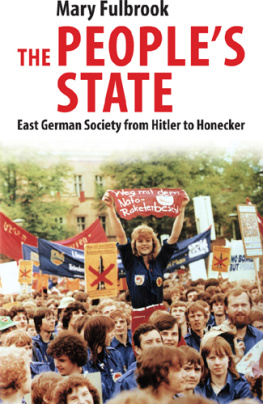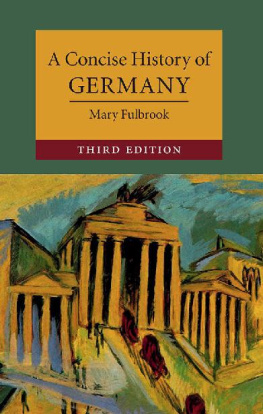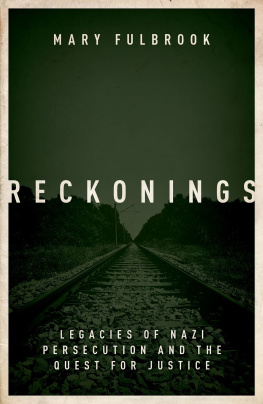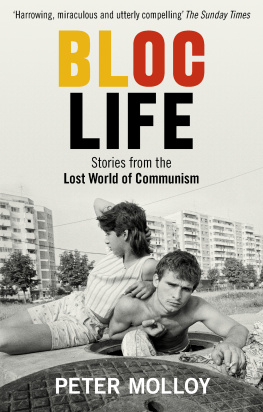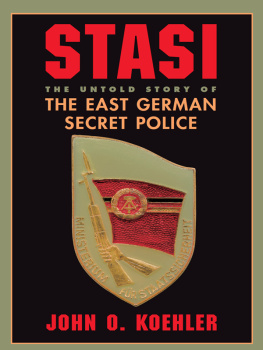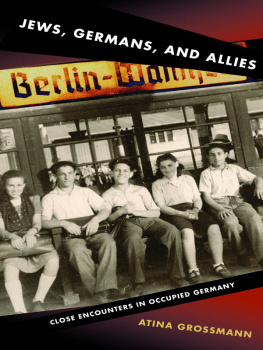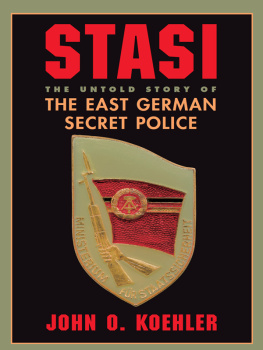THE PEOPLE'S STATE
Educated at Cambridge and Harvard, Mary Fulbrook is Professor of German History at University College London. She is the author of the best-selling A Concise History of Germany, and a leading authority on the two Germanies of the Cold War and after. Among her other publications are Anatomy of a Dictatorship: Inside the GDR, German National Identity after the Holocaust, and Historical Theory.
The People's State
East German Society from Hitler to Honecker
Mary Fulbrook
Yale University Press
New Haven and London
Copyright 2005 by Mary Fulbrook
First printed in paperback in 2008
All rights reserved. This book may not be reproduced in whole or in part, in any form (beyond that copying permitted by Sections 107 and 108 of the U.S. Copyright Law and except by reviewers for the public press), without written permission from the publishers.
For information about this and other Yale University Press publications, please contact:
U.S. Office: sales.press@yale.edu yalebooks.com
Europe Office: sales@yaleup.co.uk www.yalebooks.co.uk
Set in Minion by Northern Typesetting
Printed in Great Britain by MPG Books Ltd, Bodmin, Cornwall
ISBN 9780300144246 (pbk)
Library of Congress Control Number 2005932990
A catalogue record for this book is available from the British Library
10 9 8 7 6 5 4 3 2 1
Contents
Illustrations

Plates
Figures
Tables
1. Female mayors of towns and communities in the DGR in 1984 and 1987$168
Preface
In the mid-1990s, I was intrigued by the comments made by a tour guide at Colditz Castle, an intelligent and educated young woman, metaphorically one of Honecker's children a product of the German Democratic Republic (GDR). She continued unselfconsciously to reproduce GDR historical interpretations and related vocabulary (such as the alleged liberation of East Germans by Soviet troops), even in talks to western visitors several years after unification. When I asked her about her experiences and life before 1989, she protested repeatedly that it was possible to lead a perfectly normal life (ein ganz normales Leben) in the GDR. This is an assertion that I have met with repeatedly since then, among East German friends and acquaintances, and among interviewees in the five new Lnder (as the area of the former GDR is often termed); and East German students attending UCL (University College London) often tell me that they have been shocked by reports in the press and history books about how bad their dictatorship was a sharp contradiction to their own memories of happy childhoods and the perfectly normal lives led by their parents, friends and relatives.
Yet such professions of normality have to be set against the many other stories: of those who had to make agonising choices that resulted in stigmatisation, loss of a career, imprisonment or involuntary exile; of those whose lives were blighted by the loss of friends and relatives who fled to the West, or who were unable to visit places of interest and see people who were important to them; of those who constantly trod a fine line between saying what they really thought and saying what they thought the teacher, the factory works manager, the trade union or Party functionary would want to hear them say. Even without exaggerating the significance of the secret police, or Stasi, for the millions of East Germans who never overstepped the political mark, there was enough to feel oppressed by and to complain about in a state in which even a sudden consignment of bananas could be a major event and cause of mass excitement.
It is the latter, more sombre, aspects of life in an enclosed dictatorship, crawling with Soviet tanks, with a landmark Wall and a failing economy, which have to date received the greatest attention in the literature on the GDR. Political repression and opposition are central themes, as are popular protests and, eventually, the successful revolution of 1989. But it is equally important to understand what the structures and experiences of life were like for the vast numbers of East German citizens who did not hit up uncomfortably against the limits of the state, and who saw their lives whether at the time, or with the partially nostalgic spectacles of hindsight as interesting, varied and full of educational, career and leisure opportunities. We also have to understand how it was that many East Germans felt, at least at certain times, that it was possible to take initiatives, raise their voices, and contribute to the building of a better future within actually existing socialism.
In short, there are conflicting narratives here, and the latter narrative that of perfectly ordinary lives has been drowned out by the narratives of power and oppression or, when heard, rapidly rejected as a form either of political apologetics or retrospective nostalgia. But it seems to me that if we are to gain any form of adequate historical understanding of what is often too readily dismissed as the second German dictatorship, the conflicting narratives need deeper exploration: it is important to try to comprehend how both were possible. We have to try to understand how a set of social and political arrangements that appear not merely unacceptable, but even bizarre and unintelligible to many outside observers as well as internal opponents, could appear perfectly normal to many who grew up within the parameters of this state. We have to try to understand how such a sense of normality was arduously constructed over time, and how, in the process, the very constitution of social groups and collective patterns of attitude and behaviour shifted and changed.
We also have to explore just how far the structures of East German society were transformed over the forty years of separation from the West following the collapse of Nazi Germany. East German society was very different in 1989 from German society under Hitler, from the apparent achievements and triumphalism, and the racism, murderous brutality and ruins, of the Nazi peacetime and wartime years from 1933 to 1945. To understand the history of the GDR is both to place it in a line of historical continuity with this shared German past and also to explore just how much had changed just how far Ossis, or easterners, differed from their predecessors under Nazi rule and why these changes had occurred. And, as many commentators noted with a degree of surprise at the time, the Ossis who swarmed across the Wall in the euphoria of November 1989 turned out to be very different in all manner of ways from the Wessis, or West German citizens of the Federal Republic of Germany. It is important to gain a deeper understanding of these differences than what is available in the jokes and stereotypes surrounding unification. The East German past is as much a part of the history of today's Federal Republic of Germany as that of West Germany, which has tended to loom far larger in public perceptions of German history.
This book is not a political tract. My concern is neither to denounce nor defend the now defunct GDR: I have no personal axes to grind.
Why should one have to say this explicitly? Because so much of the historical writing on the GDR has been overtly or implicitly politicised, written to condemn or to exculpate, to overcome or come to terms with, the curious legacies of the GDR. Any historical reconstruction of a relatively recent past is at least to some extent about people who are still alive and who have a stake in the way their lives and actions are (mis)represented. Interpretations of recent or contemporary history are therefore almost inevitably controversial with respect to evaluations of the ways in which people still living have acted in the past. And when what we are dealing with is a communist dictatorship that was founded on the ruins of Hitler's Third Reich and which ultimately collapsed and was subsumed into its erstwhile arch-enemy, the capitalist democratic Federal Republic of Germany, controversies over morality, complicity and guilt are likely to involve a high level of emotion. Representations of this controversial past are almost inevitably closely related to political and moral positions, and are bound to raise considerable hackles in some quarters.
Next page
